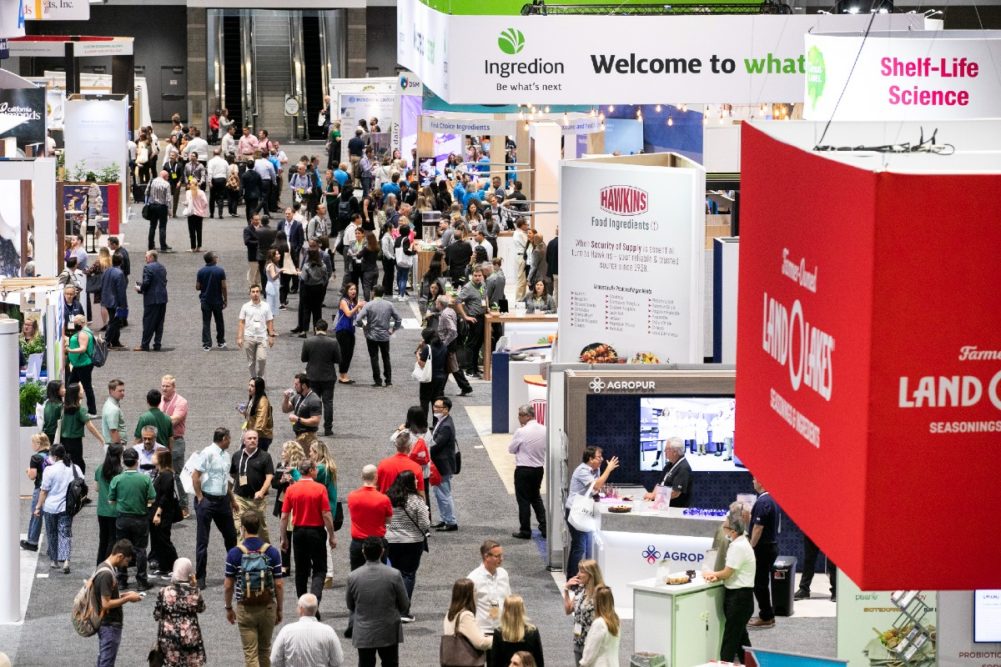Everyone attending the Institute of Food Technologists’ (IFT) annual event and expo this year will have more than innovations to consider. IFT First organizers want them to ponder what lies ahead with a much wider scope, with a show-wide focus on future-proofing the food system.
Over the course of the event, scheduled for July 16-19 at Chicago’s McCormick Place, 100 scientific sessions and multi-disciplinary discussions will cover such topics such as novel technology and innovation, food safety, sustainability and climate, health and nutrition, and consumer insights.
“Each scientific session is designed to help attendees address some of the most challenging issues impacting their day-to-day roles, as well as the broader future of food,” said Christie Tarantino-Dean, IFT’s chief executive officer.
Tarantino-Dean said some of the key scientific sessions will shine a spotlight on talking points such as food waste, technical innovations, a growing global population, food safety and consumer trust.
She said a session called “Reimaging Food Waste to Put the ‘P’ in Profit & Loss” is set to examine “the hottest product innovation ideas,” and capitalizing on upcycled food waste or by-products. IFT put together the session to help attendees improve companies’ profit and loss statements.
“Food Tech Innovations That Are Changing How the World Eats,” meanwhile, turns to leading food tech companies for insights on innovations that are changing food consumption. The session will dive into added-value products across the food supply and serving the next generation of protein solutions and sustainable ingredients.
A panel of experts will discuss the role of food science in addressing global crises during “Science of Food Is Critical to Finding Urgent Health and Nutrition Solutions for a Growing Global Population.” Tarantino-Dean said food science professionals are critical to bringing forward solutions at scale that consumers want and the planet needs.
Preventing food-borne illnesses and other problems will be the focus of the session titled “Expect the Unexpected: Failure to Anticipate Threats Is a Critical Food Safety Risk.” Tarantino-Dean said it will address “tough questions organizations must be asking themselves” about investments, strategies and implementation.
IFT First’s final education session is called “How Consumers’ Food Choices Are Impacted by Crisis.” A panel will discuss how the food community can work together to bolster trust among consumers to create a more transparent and sustainable future.
Specific to dairy processors, Tarantino-Dean expected a number of onsite events and sessions to be of interest. Some of those will cover alternative ingredients. A session on animal-free milk proteins will show how some food scientists are using microbes to create sustainable alternatives. And an interactive session called “What Processing Technologies Are Leading to More Sustainable and Resilient F&B Production,” will showcase the science and technology of alternate proteins and precision fermentation.
In addition to a dairy foods division social and a showcase presentation from the dairy foods division graduate research competition, Tarantino-Dean said dairy processors attending IFT First can search by product category and ingredients/additives to find specific exhibitors and curate their experience.
“There has never been a better time, or more important time, to attend IFT First,” she added. “We are looking forward to the dairy community joining us.”
In total, the show’s organizers anticipate more than 17,000 people will attend this year. Tarantino-Dean said the event will include 800-plus exhibitors, displaying the latest in food ingredient, equipment, processing, technology and packaging solutions, as well as 500 posters featuring cutting edge science and research, and “multiple opportunities for high-value, intentional networking with science of food professionals.”
More details regarding IFT First are available on the event’s website.

